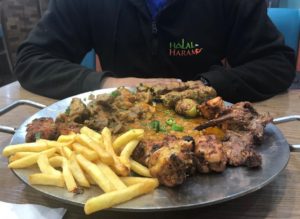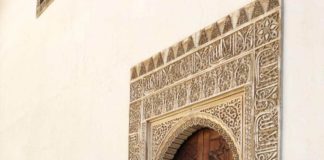Launched originally in Manchester in 2012 but with firm roots in Keighley, Bradford, Halal or Haram is an initiative that aims to help Muslims make the right dietary choices.
Inspired by an outcry from the Muslim community for guidance on permissible foods, Asif Iqbal at Halal or Haram has spent the last nine years informing people on what is acceptable to eat in the Islamic faith by creating a website, popular infographics, Youtube videos, newsletters, and yummy recipes.

The Halal Monitoring Committe UK, which is an independent, non-profit, registered charity organisation whose main aim is to certify the production of genuine halal food, describes the word “halal” as being: “An Arabic term which means permissible or lawful in Islam. In reference to food, it is the Islamic dietary standard, as prescribed in the Shari’ah (Islamic Law).”
The word “haram” is another Arabic word that means: “impermissible or unlawful in Islam.”
Asif Iqbal, founder and CEO of Halal or Haram said: “I originally set the Facebook page up in 2012 when the horsemeat scandal was going on. One day a colleague at work gave me a breakfast bar and before I could eat it, I had to check if it was suitable in line with my dietary requirements. It turns out that it wasn’t and the colleague who gave it to me also follows the Islamic faith and just didn’t know.
“After researching what foods is permissible to eat for myself, I thought I should let other people know which is why I set up the Facebook page and then the website. A lot of people started sharing the page and it has now been liked by over 300,000 people.
“Since then I have appeared on a Muslim show in Coventry and have had articles written in the Guardian about the work that I’ve done. The social media accounts and the site have done very well but since I work full-time it gets a bit hectic trying to keep the content fresh and the website updated.”
Mr Iqbal, who works full-time in IT after graduating from Leeds Metropolitan University in 2005, studied a course in Islamic law theology after his undergraduate degree which has inspired his work on Halal or Haram. He also talks to Islamic scholars who not only inform what food items are halal or permitted to eat but the theology behind them.
“After researching what foods is permissible to eat for me, I thought I should let other people know which is why I set up the Facebook page and then the website. A lot of people started sharing the page and it has now been liked by over 300,000 people.”
Sharing the reasons why some foods are impermissible is important because it gives the reader an informed choice on why the food item goes against the faith. One example of letting people make their own decision on what they can or cannot eat is in McDonald’s. As fish is halal and is cooked in separate vegetable oil, one could theoretically eat it under Islamic faith, however, there is a risk of cross-contamination with other non-halal meat products, therefore it down to the discretion of the individual of whether they believe it is permissible to eat.

Mr Iqbal went on to say: “I get so many people around the world asking about what food you’re allowed to eat under Islamic faith or not. I also get really weird questions like ‘Is cosmetic surgery halal?’
“I also get lots of questions from vegetarians, vegans, and non-Asian people who are curious about what is in their food.
“One woman from Wales messaged me asking about what sweets are halal to eat because her child has Muslim friends from school and she wanted to know what was okay for them to eat.”
One food that is surprisingly not halal is M&Ms. In the Hanafi school of thought, it is haram to eat insects except for some like grasshoppers and locusts. Carmine, which is used as a food colouring and forms the basis of the popular E120, is used to colour the red M&M, which is derived from the shell of a beetle, therefore making it impermissible to eat.
When not working at his day job at Telefónica or researching the ingredients of foods, Mr Iqbal also updates the websites with recipes that have garnered the attention of Alison Hammond from ITV and 2012 MasterChef winner Shelina Permalloo.
Mr Iqbal also stated: “As of right now, I do work on Halal or Haram in my spare time. When my partner and I go to the supermarkets, I spend double the time it usually takes to shop just looking at the ingredients of foods to put up on my website and social media. For a one-man army, I get really good feedback. I’ve had a lot of people ask me to create an app but unfortunately, it is just too expensive to create. I want to create more content on Youtube but finding the time is pretty difficult.”
Local restaurants such as Manjaros which offers halal prepared and cooked food often ask Mr Iqbal to patronise the eatery in exchange for a review that boosts customers. In addition to this, Mr Iqbal updates the website during Ramadan to include daily prayers and articles mentioning different charities in the area to keep the website and offer something else back to the community.
To find out more, you can visit Halal or Haram here.




